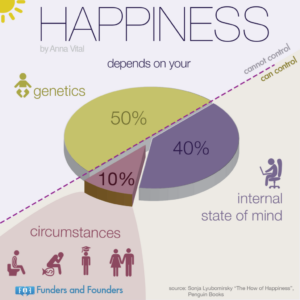In these times of pandemic, dirty politics, and revolutionary unrest, we are confronted by the need to grieve our half-million-and-more dead amidst the press for an urgent reckoning with the vast social cruelties upon the backs of which democracy was built. If there were ever a time for collective mourning, remorse and witness, now would be it.
Yet instead of offering us a path towards facing our collective and singular losses and traumas, one major branch of psychology, positive psychology, has been working overtime in the opposite direction, positioning itself as the guardian at the gates, helping us to defer, deny, and devalue that task of working through. Its proponents argue that positive psychology should be the premiere authority on mental health and well-being for one indisputable reason: It has science on its side.
The view of positive psychology as the “happiness science” has been relentlessly promoted in publications from The New York Times to The Atlantic. Positive psychology proponents assert that happiness should be your chief goal, and that optimism in these times is not a sign of privilege or of an unrealistic denial of the aftershocks of injustice, but rather is a hallmark of superior mental health.
In their journal publications, and especially in the self-help positive psychology books that fill the walls of seemingly every retailer, readers are assured that the happiness promotion techniques being offered were developed “according to research,” direct from the labs of the most elite academic institutions, of the likes of Yale University’s Happiness Lab.

And what these prestigious researchers have supposedly found, to the relief of anyone who might harbor a deep concern regarding the effects upon our most vulnerable of racism, poverty and injustice, is that circumstances and environment matter very little in the quest for personal happiness; “only about 10%,” as reported, for instance, in a 2018 NPR Science Friday interview of Laurie Santos, a primatologist who studies caged primates.
Rather, they suggest that personal happiness can be attributed, as the science reassures us, to our genes on the one hand and our habits of self-control on the other, while even that latter additional determinative factor was viewed as attributable to one’s use of superior hereditary capacities to exercise it.
Psychological Eugenics: An American Tradition
The emphasis on hereditary happiness is nothing new, nor are the exaggerations of its promise. More than a hundred years ago, when Western scientists adapted Darwinian theories of evolution in order to develop the science of “human betterment” (or “racial betterment,” as they called their eugenics mission), readers were assured of empirically designed personal and social utopias.
According to Applied Eugenics, one of the most popular eugenics books, which was also used as a primary textbook across numerous US colleges and universities, eugenic sciences ensured “harmony with the underlying plan of the universe” and “totality of happiness of all sentient beings or of all men.”
Starting with Galton in the late 1800s, eugenicists were dedicated to collecting data on supposedly hereditary human differences, which included not only “intelligence” and “health” (their primary focus) but also various personality characteristics. Galton’s original strategy, followed by Western psychologists ever since, was to create lists describing superior evolutionary paragons:
A considerable list of qualities can easily be compiled that nearly everyone except “cranks” would take into account when picking out the best specimens of his class. It would include health, energy, ability, manliness, and courteous disposition.

Galton’s original studies of “hereditary genius” included Cambridge university graduates and “great men of history.” The superior capacities of these unparalleled individuals were thought to be “as essentially determined as are physical features through the hereditary endowment.” Eugenicists from Galton on used a variety of “scientific tools” (especially statistics and testing), as well as the authority of their positions at premier universities (Harvard, Yale, Princeton, Columbia, Stanford), to offer these studies of the genetic origins of human disposition a scientific pedigree.
Ironically enough, however, these “scientific” findings were likewise used to reinforce the importance of discipline in the quest for happiness. The improvement of human experience and the happiness of individuals were often presented as within reach, according to science, if one only worked hard enough on cultivating self-containment (even despite the concurrent belief in the power of heredity to determine such a capacity).
In fact, the growing influence of neurological science only bolstered the idea that while the genetic endowment of superior brain function determined character, superior character could likewise determine the functioning of the brain. Thus, the proliferation of widely-admired self-help books like Eugenic Sciences and Sex Life, by Mary Melendy, a University of Chicago medical scientist, who advised her readers that an essential factor in the guarantee of a good life involved the capacity to control emotions and always be cheery.
A sunny disposition is most beautifying….Never look on the dark side of anything. If it has no bright side, don’t look at it at all. Look at something else. Never speak or even think ill of another. These habits once formed become literal brain-paths along which it grows easier and easier for the thoughts to travel, bringing gladness, health and symmetry to every nerve and tissue. In countless cases such results have been achieved.
For all the airy advice on self-improvement that was yielded by such “scientific” findings, however, the darker side of the quest for universal happiness was far more extensive. The wish to eradicate certain human tendencies towards misery, sloth and ill-temper went hand in hand with an effort to eradicate the people who were associated with these traits. In concert with his celebration of the human characteristics that made a person a “great man,” Galton also encouraged the exclusion of other traits, and thus of the individuals who manifested them, “self-sacrificers, self-tormentors, and other exceptional idealists.”
Concurrently, based upon “scientific” studies of racial and other differences, entire groups were determined to be lacking in hereditary superiority, including all non-Nordic, non-White individuals, immigrants, women, sexual minorities, people with disabilities, people with mental distress, people living in poverty, communists, and everyone else who fell outside a small box of proven “normality.”
A popular psychology book, filled with numerous graphs, statistical data summaries, and empirical observations by a Who’s Who of eminent researchers—Harvard psychologist Robert Yerkes, Carl Brigham, a Princeton psychologist and developer of the SAT, Edward Thorndike from Columbia, John B. Watson, the founder of behaviorism, and Stanford’s Louis Terman, developer of IQ testing—was dedicated to ensuring the happiness of America by addressing “the menace of race deterioration or the evident relations of immigration to national progress and welfare.”
Just as happiness was a matter of demonstrating the self-discipline to close off parts of character that were unseemly or weak, the steps required to ensure Americans’ happiness involved segregating non-White people and closing borders to non-Nordic immigrants.
These “discoveries” made in psychological laboratories were increasingly seamlessly translated into explicit public policy recommendations. Another leading American eugenicist—psychologist Goddard, whose infamous 1912 Kallikak study became the foundation for supposedly proving heredity or “feeble-mindedness”—actively promoted closing borders to all “unfit” immigrants, segregating and sterilizing all supposedly unfit people, removing the right to vote from all but the evolutionary fit “aristo-democracy,” and employing “unfit” people in the most dangerous forms of labor (his own Vineland asylum for “backward” and “feeble-minded” children was celebrated by eugenicists in 1918 for placing people with developmental disabilities into “hard labor”).

In a speech to a scientific community, Goddard guaranteed that “the elimination of… feeble-mindedness would result in an enormous improvement in happiness and… achievement in every community” and even insisted, paradoxically, that “institutions for the feeble-minded… are the happiest places in the world.”
Meanwhile, this focus on the inherent traits of strength and weakness, happiness and misery, that were manifested unequally in human nature, meant that attempts to modify problematic aspects of the environment were doomed to fail, if they were not outright immoral.
For one thing, eugenicists insisted, relieving inferior people of the exigencies of life made no economic sense; Karl Pearson, for example, the father of statistics, advocated for improving “the condition of the race through parentage” because to do so is “five to ten times as advantageous… as through change of environment.” Pearson routinely shamed his readers for their non-scientific “philanthropic efforts” (e.g., humanitarian work, provision of services to the unfit), which “overlooked great all-mastering biological laws,” and supposedly led the “civilized” countries to be “confronted with race suicide.”
Along with numerous other eugenicists, Julian Huxley (a British eugenic exponent whose ideas were influential in America) insisted that changing the social environment or offering help to the “unfit” was not only financially costly and socially untenable, but would make “unfit” people who receive help become “discontent,” “neurotic” and “inefficient.” Rather, individuals were encouraged to ignore their social and environmental conditions or problems, and not to engage in humanitarian efforts, lest they would undermine the flow of evolution.
The one exception to environmental modification involved ridding the world of the eugenically unfit via controlling their procreation, segregating them, or prohibiting their migration. As Guyer stated,
While many an enthusiastic humanitarian is laboring under the assumption that if we can improve external conditions human deficiencies will disappear, the student of heredity realizes that this is in large part a delusion unless we can secure an accompanying improvement in intrinsic qualities of the human species itself through the suitable mating of individuals.”
In retrospect, it is hardly surprising that this vision of hereditarily genetically superior people, “protective” laws reinforcing the boundaries between the desirables and the rest, and the encouragement to disregard rather than mitigate the effects of environmental factors, might have culminated, as indeed Pearson expressed in his University College London 1934 retirement speech, in the quintessential eugenics project of our time, Nazism.
The Persistence of Eugenics
Notably, eugenics did not end with revelations of eugenic Nazi atrocities, but in fact, is alive and well to this day. According to writers on scientific racism, such as Tucker and Saini, eugenic sciences continue to focus not only on the measurement of intelligence, but also on assessments of hereditary optimism.
For example, the Pioneer Fund, whose mandate, according to the Southern Poverty Law Center, is to “pursue ‘race betterment’ by promoting the genetic stock of those ‘deemed to be descended predominantly from white persons who settled in the original thirteen states prior to the adoption of the Constitution,’” subsidized the twin and adoption studies by Thomas Bouchard of the University of Minnesota that not only “proved” genetic racial differences in levels of IQ, but also in levels of “gregariousness.”
Bouchard’s studies were used as a foundation for the original positive psychology promotions by Martin Seligman. In his 2002 book Authentic Happiness, Seligman routinely dismissed the role of the environment in shaping human personality, supporting his claim with “careful research from the University of Minnesota,” i.e., Bouchard’s Pioneer Fund studies, which show that “there is a personality trait of good cheer and bubbliness (called positive affectivity), which, it turns out, is highly heritable.” Seligman continued to emphasize this point in his 2011 book Flourish stating that science has proved that only “character and heredity” account for “what people do.”
This science of “positive psychology,” the new name given to eugenic science, gave special emphasis to Seligman’s famed concept of “learned helplessness,” which was based on his torture of caged experimental animals, dogs, for which he offered—in ever decreasing font size and length—weak apologies. His excuse for his treatment of animals was that “there was no way I could ethically give trauma to other human beings. This seemed to leave only experiments with animals.”
Yet Seligman’s involvement with torture did not end with comparative animal experiments after all; he was named as a central figure in psychologists’ involvement in the development and deployment of “enhanced interrogations techniques” on human beings in an American “war on terror.”
The report on Seligman’s involvement highlighted a Department of Defense payout funding his Comprehensive Soldier Fitness program, whose aim, as Seligman described it, was “to increase the number of soldiers who derive meaning and personal growth from their combat experiences” These funded studies provided the primary source of material for Flourish as well as for the subsequent positive psychology pop oeuvre on “post-traumatic growth” and the roots of happiness in personal self-control.

The positive psychology movement today maintains all of the contradictions and logical fallacies inherent in the original eugenic studies. Despite Seligman’s main “discovery” that traumatizing animals crushes their spirits, this re-branded positive psychology movement is more emphatic than ever that environmental factors can be disregarded as causes of distress.
As described by one of Seligman’s positive psychology colleagues, Mihalyi Csikszentmihalyi, the celebrated author of Flow:
This general malaise is not due directly to external causes. Unlike so many other nations in the contemporary world, we [Americans] can’t blame our problems on a harsh environment, on widespread poverty on the oppression by the foreign occupying army. The root of the discontent is internal, and each person must untangle them personally, with his or her own power.
Further, although one would think that pinpointing the primary cause of distress within the individual might lead to an appreciation of psychotherapy as a tool for addressing it, nothing could be further from the case. Positive psychology was properly seen, Seligman and other insisted, not as a justification for psychotherapy so much as a replacement for it, and especially as an alternative to depth and psychoanalytic treatments, which he decried as unscientific and even dangerous. Rather, Seligman offered positive psychology as quick method to go “from plus two to plus seven” while decrying psychology that focused on helping people heal:
Psychology now seemed half-baked to me. The half that was fully baked was devoted to suffering, victims, mental illness, and trauma. Psychology has worked steadily and with considerable success for fifty years on the pathologies that disable the good life, which make life not worth living.
More recently, Seligman presented positive psychology as a “new science of personal control” that supposedly works while “in general, talk therapy techniques all share the property of being difficult to do, no fun at all, and difficult to incorporate into your life.”
This DIY approach to the achievement of happiness, again ironically, has been quite a gold mine for the publishing industry. Like the science of eugenics before it, positive psychology once again became a bourgeoning empire of self-help books, scientific journals, conferences, and media promotions.
Just as the original eugenic books always included terms such as “science” or “study” on their covers, positive psychology book titles do not veer from this formula (for example, The How of Happiness: A Scientific Approach to Getting the Life You Want and Positivity: Top-Notch Research Reveals the 3 to 1 Ratio that Will Change Your Life).
Filled with scientific terms and empirical data, these books always insist both that happiness is in your blood (genes) and under your individual self-control. And, they tell us, examining one’s environment, especially one’s past, is dangerous.
Seligman’s warning against “contemporary American demagogues who play the race card, invoking reminders of slavery … at every opportunity, create the same vengeful mindset in their followers” is unchanged in a 2017 New York Times review of The Homo Prospectus, in which Seligman summarized: “Homo prospectus… doesn’t dwell on the past: There’s nothing he can do about it. He became Homo sapiens by learning to see and shape his future, and he is wise enough to keep looking straight ahead.” Any efforts to look back—or around—will result in “learned helplessness” and “blaming” others or external factors on one’s lack of personal happiness.
And terrible things befall the unhappy people, especially people who are sad or angry, since according to Seligman’s 2006 review of studies, “Happy people, furthermore, have… feistier immune system than less happy people” and are “more apt to be elected than pessimists are,” possess “unusually good” health, “age well,” are “much freer than most of us from the usual physical ills of middle age,” and “may even live longer.”
Not surprisingly, the far right and White supremacy sites, especially those that use scientific rhetoric to justify their ideology, openly embrace positive psychological science. Among the most active of such groups, the American Renaissance, routinely republishes summaries of positive psychology findings that prove that happiness is (once again) the provenance of people with superior genes. According to the American Renaissance website, the “Danish DNA” is a “key to happiness,” and a Canadian study shows that, “extreme conservatives make happier people.” As Jacobs summarized for American Renaissance readers:
On the general level, greater generalized authoritarianism was clearly related to greater subjective well-being,” the researchers write. “The association suggests that generalized authoritarianism may be ‘good’ for the self.”
Positive? Not Positive
There have been a plethora of critiques of the “science” of positive psychology, yet they rarely seem to make even a ripple in mainstream publications. Ehrenreich’s Bright-Sided should have served as a strong warning against this new promotion of happiness science, especially as it was reinforced by another book that traced the funding of positive psychology to far-right sources. As she noted in a 2007 article, “the right-wing philanthropist is pushing the phony science of positive psychology to numb Americans into smiley-faced acquiesce to the status quo.”
A great—and still growing—number of studies show that positive psychology’s claims are unsubstantiated, misleading, and often downright false. For example, Pérez-Álvarez’s empirical research findings demonstrated that individuals who self-identified as “happy” were also more likely to be assessed as “conceited, selfish” and even “sad” when they endorsed valuing or seeking personal happiness as a goal.
In a review of Fredrickson’s work, which Brown, Sokal, & Freidman saw as exemplifying positive psychology, they noted that “positive psychology did not live up to these claims” of the superior rigor of its science, which are described as “romantic scientism” and “voodoo science.” Perhaps the most cogent assessment was made by Pulitzer-prize-winning journalist Chris Hedges who, in his book Empire of Illusion, stated that “positive psychology is to the corporate state what eugenics was to Nazism.”
In current times, the pandemic has given a renewed push in the press to eugenic rhetoric, embracing “herd immunity” (which involves a sacrifice of the weak to insure the survival of the herd), and touting, even by a former US president, “race horse theories” (which advocate selective breeding in order to enhance a country’s prowess) beloved by American eugenicists and German Nazis alike, while hundreds of thousands of people are dying, many of them due to having experienced racial and financial injustice.
Social uprisings against systemic racism and widespread sexual violence compete with media coverage of White supremacist rallies and an attempted coup. While we should be preoccupied by growing economic disparities, the destruction of the environment, wars and refugee crises, political rifts, instead, we are told by walls of books and podcasts, TED talks, and blogs to “never look on the dark side.”
More than ever, despite a thousand anti-stigma campaigns, anger and sadness are proclaimed to be forms of mental illness, and guilt, shame, and regret are relegated to the status of disorders rather than examined in relation to ways we often tacitly participate in oppression of others and the internal sequelae of trauma.
Yet our eugenic past holds lessons on how to stand up to such scientific ideologies. We could learn from brave journalistic investigations (e.g., Walter Lippman’s work on the branding of orphans as having “parasitic germo-plasms”). We could learn from social criticism (e.g., G. K. Chesterton’s Eugenics and Other Evils); we could learn from the fiction, poetry, art and critical scientific inquiry that are available all around us, if we only have eyes to see.
What we could remember and learn from our collective past is that “according to research” may justify all manner of social violence and moralizing, and is infinitely corruptible without constant questioning, dialogue and rigorous inquiry. We could learn, if we only dare to look, that joy can spring from the capacity to embrace the entire range of our internal sentiments, anger and sorrow among them.
Most of all, we could learn from experience that we cannot create world in which happiness can live without working towards a world in which justice prevails.





We aren’t dealing with coherent thought here. Even though there may be many excuses, I’d like the positive psychology addicts to tell me why unmedicated “schizophrenics” don’t get cancer, unlike the “healthy minded”, who frequently die of it before spreading their valuable genes throughout the universe.
Report comment
THIS is the kind of hard-hitting journalism that I hope to see more of here. I learned from this, especially the parts about Martin Seligman and his involvement in the CIAs development of “enhanced interrogation techniques”. I was already a critic of positive psychology but I honestly had no idea how insidious and subversive it’s roots are. THANK YOU!!!
I only want to add that I passed a billboard for one of the military branches the other day that advertised “finding meaning” in military service or something to that effect (“purpose”, “community”, I can’t remember the exact wording now.) I remember thinking about how the military recruits its lowest ranking members from poor and disadvantaged communities and here it is offering military service as a path toward finding meaning or purpose in the lives of those desperately seeking a leg up and a sense of belonging in a culture that otherwise devalues those communities. One need only look at the racial and socioeconomic differences between those recruited to the front lines vs those who enter as officers to see who really matters. And recruits are notoriously lied to, promised things the military has no intention of delivering. Few among the poor know how many low ranking members of the military survive on food stamps or that their bodies are intended as canon fodder and to be trained as killers for the advancement of the US empire rather than toward keeping peace in the world. It’s all propaganda.
Anyway, this was a very educational read.
Report comment
Another great blog exposing some of the deeper elements within neoliberalism and its justification for a class based capitalistic system.
Combine this exposure of the oppressive roots within Positive Psychology with James Davies’ book “Sedated,” and you now have a powerful pair of ideological weapons exposing the finer points of ruling class control and domination. Psychiatry and their Medical Model fits right into this paradigm of “genetic theories of original sin.”
And we all must carefully examine many aspects of New Age Spiritualism, which also has a strong current of Positive Psychology meandering through its ideological underpinnings.
Richard
Report comment
Excellent writing and thank you for publishing this on MIA.
“More than ever, despite a thousand anti-stigma campaigns, anger and sadness are proclaimed to be forms of mental illness, and guilt, shame, and regret are relegated to the status of disorders rather than examined in relation to ways we often tacitly participate in oppression of others and the internal sequelae of trauma.”
The anti “stigma” ads and posters are designed to further rope the public in. The only “stigma” comes from the health/public services themselves.
Report comment
I loved this article! It really gets to the heart of these eugenic, racial superiority themes, which have been around for centuries, probably millennia. It’s a bit shocking even to me how the exact same language is used today that was used 1-200 years ago. It goes to show that the real problem with psychiatry, and our society at large, isn’t a failure of honest people to understand the issues, the real problem is certain people believing they are superior to other people and looking for “science” to justify their continuing acts of oppression.
Report comment
It amazes me that we can think and live at all with the near constant bombardment of ‘experts’ pushing their ‘research shows’ for their own self interest and the more sinister often well disguised vested interests.
Report comment
Money.
Report comment
yup, readers often hustled to purchase this that and the other ‘thing’ at the end of article/s…
Report comment
Thanks for your research and writing this. Funded by right wingers, eek, should have known. Makes sense & makes it even creepier than usual. Stay safe.
Report comment
“We could learn, if we only dare to look, that joy can spring from the capacity to embrace the entire range of our internal sentiments, anger and sorrow among them.
“Most of all, we could learn from experience that we cannot create [a] world in which happiness can live without working towards a world in which justice prevails.”
I agree. And that comes from a mother who, upon being handed over medical evidence of a mother’s (almost) worst nightmare, understood that, at least now I knew the truth. And the truth can set you free.
And I agree, until we have justice for child abuse survivors – and the “mental health” system get out of the pedophile aiding, abetting, and empowering – systemic child abuse covering up business. There will exist anger and sorrow.
Although, at least knowing the truth does allow one to run from the bad actors of the “mental health” and religious industries, who’ve “partnered” to cover up child abuse, for profit.
Thank you for pointing out the stupidity of “Never Look on the Dark Side.” Since there are good and bad people and ideologies within all groups. And now that we all live a “pedophile empire.”
https://www.amazon.com/Pedophilia-Empire-Chapter-Introduction-Disorder-ebook/dp/B0773QHGPT
We do actually need to look at this “dark side,” so we may work to fix our societies’ real life problems.
Report comment
It appears from this article that both right wing and left wing groups have helped finance research on this “happiness/eugenics.” It also appears there is way much more than is in this article about this issue. This article only skims the surface. Also, if you read this article and realize that the goal of psychiatry along with big pharma is to compel and/or force their “patients” to take “happy pills” or “pills for personality”–i.e. SSRIS, Benzos, neuroleptics, etc. you will see that the concept of “happiness/eugenics” is tragically non-discriminatory and thus no matter who you are in America and probably the world you have suffered from it one way or another. But, since, we know that we have been egregiously conned; we can work towards solutions to free us all from these types of evils. Thank you.
Report comment
Might find this of interest
Whitney Webb is joined by Johnny Vedmore to discuss two organizations, Wellcome Leap and Trinity Challenge, whose founding members were the architects of the most controversial COVID-19 policies and narratives. Both groups are actively developing new invasive methods of surveillance and eugenics, all under the guise of preventing the next pandemic and improving global health.
https://soundcloud.com/unlimited-hangout/framing-surveillance-and-eugenics-as-healthcare-with-johnny-vedmore
Report comment
“The root of the discontent is internal, and each person must untangle them personally, with his or her own power.”
This notion is also central to CBT which suggests that regardless of what goes on in your life or has happened to you, all that is required is applying “a thin veneer of positive polish” as clinical psychologist, Oliver James once said.
Report comment